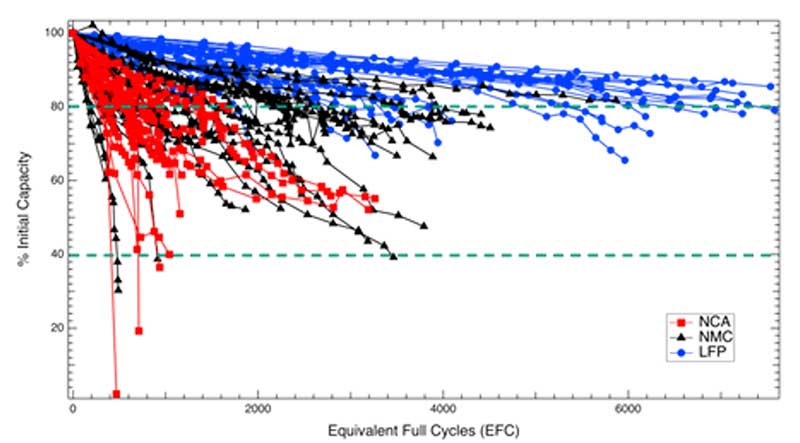Available to watch now, The Electrochemical Society discusses the seven-year cycling study of commercial Li-ion cells
Want to learn more on this subject?

The true useful life of Li-ion batteries is not well defined. Current operational cutoffs are often at 80% capacity retention, a holdover from the early electric vehicle industry that may not be applicable to other applications such as energy storage for the grid. Thus, there is little data in the open literature about systematic cycling of Li ion batteries beyond the traditional 80% cutoff.
In this webinar, we detail our ongoing study of battery-cycle aging at varied ambient temperature, discharge rate, and state-of-charge range for three different positive electrode chemistries: lithium iron phosphate, nickel cobalt aluminum oxide, and nickel manganese oxide. These commercial cells have been cycled for more than seven years and their capacity retention spans 80% to 40%. We cover trends that occur before and after 80% capacity, initial materials characterization, knee point occurrence, and sudden cell failure. This work represents the broadest assessment of commercial Li-ion battery aging in the open literature.
An interactive Q&A session follows the presentation.
Want to learn more on this subject?

Reed Wittman is a senior member of technical staff at Sandia National Laboratories. His work focuses on fundamentals of battery reliability and safety. This includes materials and electrochemical characterization of Li-ion battery degradation mechanisms during long-term cycling and fundamental origins of gas evolution in aqueous flow batteries. He earned his BSE in material science engineering at Arizona State University in 2013. He then went on to complete a PhD in energy science and engineering through the Bredesen Center, an interdisciplinary degree programme centred on all aspects of energy, at the University Tennessee and Oak Ridge National Laboratory. His PhD dissertation focused on using materials and electrochemical methods to understand the fundamental processes at the Zinc (Zn) electrode of alkaline Zn batteries.

Yuliya Preger is a principal member of technical staff in the Energy Storage Technology and Systems Group at Sandia National Laboratories. She earned her PhD and BS in chemical engineering from the University of Wisconsin-Madison and the Massachusetts Institute of Technology, respectively. Her current work is centred on the safety and reliability of batteries for grid-level energy-storage applications. Her publications span battery degradation and abuse response, application of power electronics to energy-storage safety, and system-level energy-storage safety analysis. Yuliya is co-founder of batteryarchive.org, the first public repository for visualization and comparison of battery degradation data across institutions, which has been used by thousands of individuals in academia and industry in more than 60 countries. She is currently leading the revision of the Department of Energy (DOE) Office of Electricity Energy Storage Safety Strategic Plan and the development of data-collection requirements for DOE-funded energy-storage projects across the US.








